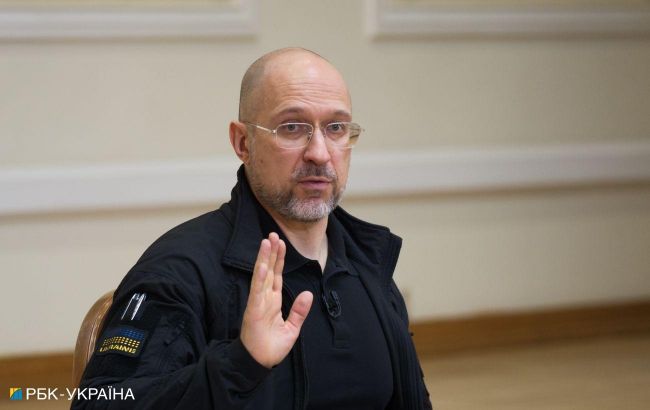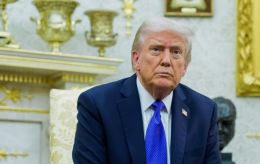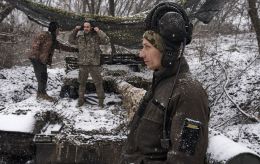Ukrainian PM on military funding, challenges for winter 2024, allies cooperation: Key highlights
 Ukrainian Prime Minister Denys Shmyhal (Photo: RBC-Ukraine, Vitalii Nosach)
Ukrainian Prime Minister Denys Shmyhal (Photo: RBC-Ukraine, Vitalii Nosach)
Prime Minister Denys Shmyhal held a large press conference dedicated to the results of the government's work for the first eight months of 2024. He reported on the successes in several areas, shared what the upcoming winter would be like, and outlined plans for the next year.
RBC-Ukraine presents the key statements of the prime minister below.
From military sector to European integration: Key highlights
Military sector.
40 billion hryvnias were allocated for the construction of the third line of defense with concrete fortifications, and the project is complete. In 2023, weapons production tripled, and in the first eight months of 2024, it doubled again. More than 1 million drones have already been contracted.
The production of artillery ammunition has begun, with initial successes in financing through partners. For example, a contract with Denmark for the supply of "Bohdana" self-propelled howitzers is being implemented. Dozens of joint defense industry enterprises have been created in Ukraine and neighboring countries. Special attention is being given to the development of long-range solutions. The goal is to localize the production of large quantities of equipment, cartridges, and shells for armored personnel carriers and tanks.
Economic sector.
100% of taxes are allocated to the needs of the Armed Forces, and the 2025 budget is being formed on the same principle. Since 2022, $100 billion has been attracted for non-military expenses. The restructuring of external debt has saved $11.4 billion. There is a political decision to use $50 billion from frozen Russian assets. The goal is to confiscate all assets, amounting to $300 billion.
This year, the US has already provided $4 billion, with the same amount expected by the end of 2024. The IMF mission is working on the fifth review of the program. The European instrument for €50 billion over the next four years is fully operational. Thanks to financial stability, all social payments have been preserved, and all planned indexations for 2025 will be carried out.
Inflation remains moderate (5.4% in July), and the economy is recovering steadily (3.7% growth in the second quarter). In terms of exports, the country is approaching pre-war levels, cashback programs like "Made in Ukraine" are operational, compensation for Ukrainian agricultural machinery is provided, and large-scale privatization is being restored.
European integration sector.
The screening of Ukrainian legislation continues. A reform matrix has been approved, which includes over 400 measures for this year alone. The economic and transport visa-free regimes have been extended, allowing cargo vehicles to cross borders freely. The overall goal is to be ready for EU membership no later than the end of 2025.
Energy sector.
The upcoming winter will be no less challenging than the previous ones. Facilities damaged by Russian attacks are being restored 24/7, necessary equipment is being supplied to Ukraine, and decentralized generation is being developed. Gas production has increased by 7%, and the heating season will rely on domestically produced gas.
Energy challenges in winter
According to Shmyhal, no one can currently predict whether there will be power outages for 4 or 16 hours a day, or whether there will be no outages at all. The Russians have not given up on destroying Ukraine's energy infrastructure.
“We are preparing for this. We will definitely get through the winter. Under what conditions? We will only see as we move through the heating season. It’s absolutely incorrect to predict anything now, and we won’t do that," the prime minister noted.
In preparation, work is being done to protect energy facilities on two levels. The first level involves the installation of sand-filled gabions, and the second level involves reinforced concrete structures that can withstand direct drone strikes and protect against missile fragments. To date, 85% of Ukrenergo's facilities have been protected this way. Separately, gas production and oil refining enterprises have also taken measures on two levels.
Additionally, there is active protection. Energy facilities are mostly within the protection radius of Patriot, SAMP-T, IRIS-T, and Hawk systems. Furthermore, each facility is covered by mobile fire groups and anti-aircraft systems like Gepard, as well as electronic warfare systems.
Decentralized electricity and heat generation are being developed. Efforts are focused on Kharkiv and the region, where the Russians destroyed all thermal power plants. Small 1 MW installations are being delivered there, and a similar approach is being applied in other cities. Partners have funded the purchase of distributed generation for 170 MW. Heating utilities have 169 cogeneration units, of which 83 have been put into operation. Partners have supported the supply of 291 more units and 101 modular boiler rooms.
"This is our reserve not only for electricity generation but also for heat," Shmyhal said, adding that schools and hospitals are equipped with generators, some even having reserve capacity. The urgent need is for about 1,800 more high-power generators.
Partners have also provided equipment from their Soviet-era power plants. Damaged thermal and hydroelectric plants are currently being restored.
Work with the IMF and military spending
The IMF mission, which is being held offline in Kyiv for the first time under the current program, is nearing completion. "The mission is challenging, and the negotiations are tough. It is essentially looking ahead to 2025. We are discussing what the budget should look like and what steps Ukraine, the IMF, and the G7 should take. I do not have the authority to announce the results, as the mission is still ongoing," said the prime minister.
Regarding the budgets for 2024 and 2025, when the 2024 budget was planned, one of the IMF’s forecasts was that the war would continue until the summer. Accordingly, military spending was based on that prediction.
"But we are undergoing mobilization, which requires more funding. We know that each soldier costs the budget 1.2 million hryvnias. As we recruit more people, we must increase the budget for the Armed Forces," he added.
By the end of the year, there is a need to cover a 500 billion hryvnia deficit. The plans for 2025 must take this year's realities into account. Ukraine must independently finance the Armed Forces. The resources have been found through domestic borrowing and other instruments. One source is an increase in the military tax.
Relations with Poland
Ukraine and Poland are not just neighbors but partners. The countries share a common history with some difficult chapters, which should be discussed openly but calmly.
"I am confident we are moving in this direction to ensure our history is not manipulated by our enemies. We continuously take steps toward each other. We had proposals to resolve everything in one go and close this chapter, but historical institutions have a certain approach. There is progress on both sides," Shmyhal said.
Ukraine and Poland are working on joint military production both in Poland and Ukraine. Dialogue on the delivery of MiG-29 aircraft is ongoing, but there are no changes so far. In addition, Ukraine has asked Poland to shoot down missiles over its western regions, where its air defense systems can reach.
"Ministry of Ukrainian return"
The idea is to bring back as many as possible of the 7.5 million Ukrainian refugees. Currently, the strategy is distributed among the ministries of Economy, Foreign Affairs, Social Policy, and Reintegration. However, it needs to become a priority.
"We plan to gather a team of people who will work daily on the strategy for the return of Ukrainians. To bring Ukrainians back, we need to motivate them where they are now. We understand that not everyone will return. But Ukrainians abroad are also our people, and they too support our country through donations and protests," Shmyhal explained.
According to him, the process must be coordinated. How will this be implemented? Work on the implementation of ideas is ongoing.
Optimism regarding 500 bln hryvnia budget
Denys Shmyhal also responded to RBC-Ukraine’s question about the basis of his optimism regarding an additional 500 billion hryvnias for military spending after the predicted revenue from tax increases was reduced in the Verkhovna Rada, and the bill was still rejected.
According to him, the first element is exceeding the tax and payment plan, which has already provided 75 billion. The second is savings on external debt servicing, amounting to 64 billion this year alone. The third is domestic borrowing. The draft budget amendments set the figure at 220 billion, but agreements with Ukrainian banks reached 225 billion.
"Accordingly, we can afford fewer taxes due to greater borrowing from banks," he said, adding that the optimism comes from the fact that this money will come in earlier than the planned tax increase.
The prime minister emphasized that there is no plan for currency emission in 2024, nor will it be included in the 2025 budget. However, he urged people not to treat the possibility of moderate emissions during wartime as a tragedy. According to him, controlled emission is allowed under the IMF program.
Gas transit to Europe
Ukraine is not negotiating with Russia on new contracts for gas/oil transit or the extension of existing ones.
"In our Association Agreement (with the EU), Ukraine is obligated to supply European countries with gas and oil. We are ready to fulfill the Agreement but will not work with Russia," the prime minister said.
Commenting on the possible replacement of Russian gas with Azerbaijani gas, he stressed that he could not comment, as the government is not involved in the negotiations.
Ukraine’s EU accession process
All the necessary political decisions have been made, and Ukraine has entered the negotiation process for EU membership. This process is more technical and indeed complex, as it involves reviewing tens of thousands of legislative and regulatory acts to ensure they comply with EU directives, making changes, or agreeing on how Ukraine will adhere to European rules but with its own nuances.
The most crucial step is the opening of negotiations on six clusters and 35 chapters. "By the end of the first half of 2025, we want to open all 35 chapters. We are forming negotiation teams for each direction, and partners are ready to provide their experts... We have passed all the stages almost in a crash course, and we need to complete the technical stage in a similarly record time. What are the challenges? Just technical work," Shmyhal noted.
Regarding potential obstacles from Hungary, he said that a constructive pragmatic dialogue has been established with them.
On economic exemptions
Economic exemptions are not entirely related to the "fight or work" principle. Ukraine has a certain approach to exemptions with several parameters.
"When we talk about the 'fight or work' principle, we want to improve the approach to exemptions. We are looking for a way to address three problems: creating additional jobs, increasing wages, and bringing Ukrainians back," the prime minister stated.
According to him, 3.5 million jobs were lost in the first months of the invasion, and the goal is to restore that number to ensure decent support for pensioners after the war.
"It can't be that someone buys their way out of defending the homeland — this is a key principle and a red line. There must be transparent, understandable exemption rules... I think we will implement them in the near future. This won't be something sensational; it will be a change to the existing exemption parameters," he added.
River pollution
According to available data, on the Russian side, a sugar factory in Tyotkino (Kursk region) discharged waste, which led to the pollution of the Seym River with organic substances, reduced oxygen levels, and caused fish deaths.
"We have clearly outlined response steps. Due to the fish deaths, there are consequences, and such fish are immediately removed... A part of the river has already been cleared, and restoration processes have taken place. At the moment, the organic matter is settling and dissolving. There are no threats to people's lives and health, and there are no threats to water intakes for Chernihiv from the Desna River or for Kyiv further down the Dnipro," Shmyhal added.
Budget for the Kursk operation
Ukraine is conducting a defensive operation across the entire front, and the Defense Forces are funded from a single budget.
"There are no separate budgets for specific operations. This budget is managed by the government, and partners support it by providing military aid... The government will ensure 100% funding for defense. No separate budget has been allocated for the Kursk operation," he responded.
Western cooperation for long-range strikes into Russia
Western partners are being convinced daily to authorize long-range strikes on military targets in Russia.
"We are confident that we will use Western long-range weapons to hit Russian military targets in a very responsible manner. Many partners have already given permission. However, key ones — the US, Germany, France, and others — have not yet officially granted such permission. We are seeking it," Shmyhal emphasized.
As for the possible transfer of Iranian ballistic missiles to Russia, there is no concrete evidence yet that they have received or are using these missiles.
"Of course, this concerns us. This is yet another factor that underscores how Russia is using weapons from its terrorist allies to strike Ukraine and Ukrainians, continuing their genocidal war and terrorism on our territory. We must have the capability to respond to such terrorism in a mirror-like manner and destroy military targets on their territory to ensure greater safety for our citizens," the prime minister added.

